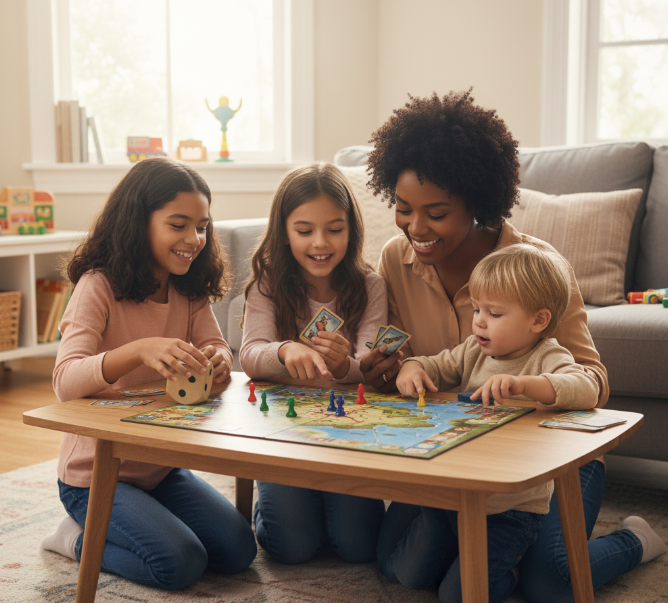Introduction
Siblings share one of the longest-lasting relationships in life. From childhood arguments over toys to shared laughter during family trips, the bond between brothers and sisters shapes their personalities, social skills, and even emotional well-being. But in today’s digital world, where children often prefer individual screen time, opportunities for meaningful sibling connection can feel limited.
This is where cooperative games step in as powerful tools. Unlike competitive games that focus on beating one another, cooperative games encourage teamwork, shared goals, and collaboration. Whether it’s solving a puzzle, completing a mission in a video game, or playing a board game that requires joint decisions, these activities create memorable experiences that strengthen sibling relationships.
In this article, we’ll explore the many benefits of cooperative games for sibling bonding, supported with real-life examples, lists, and practical tips. By the end, you’ll understand how simple playtime choices can transform sibling rivalry into sibling teamwork.
Why Cooperative Games Matter in Sibling Relationships
Children naturally compete for attention, resources, and independence. This rivalry can sometimes lead to conflicts, misunderstandings, or even resentment. Cooperative games, however, shift the focus:
-
Instead of competing against each other, siblings work together.
-
Success is shared, not divided.
-
The sense of accomplishment comes from collaboration rather than outshining one another.
This makes cooperative games a unique bonding activity that nurtures trust and empathy while teaching essential life lessons.
Key Benefits of Cooperative Games for Siblings
1. Building Stronger Emotional Connections
When siblings work toward a shared goal, they celebrate victories together and support each other through setbacks. This teamwork nurtures a sense of closeness and shared identity.
Examples of emotional growth through games:
-
Comforting a younger sibling when they make a mistake.
-
Celebrating small wins, like finishing a level or solving a puzzle.
-
Encouraging each other to keep going when the challenge feels tough.
This kind of emotional connection helps siblings see each other not as rivals, but as allies.
2. Improving Communication Skills
Good communication is at the heart of cooperative play. To win, siblings must explain their ideas, listen carefully, and make decisions together.
How communication grows through games:
-
Discussing strategies in a board game.
-
Giving directions during a team-based video game.
-
Asking questions and clarifying rules.
Over time, these skills transfer into daily life. For example, siblings who learn to explain game strategies often find it easier to share chores or solve conflicts at home.
3. Reducing Sibling Rivalry
Sibling rivalry often arises when children feel they must compete for attention, toys, or achievements. Cooperative games replace competition with collaboration, lowering tensions.
Why rivalry decreases:
-
Both siblings win or lose together, reducing feelings of jealousy.
-
Teamwork rewards cooperation instead of competition.
-
Shared goals make siblings value each other’s contributions.
This doesn’t mean conflicts disappear entirely, but cooperative games provide a healthier outlet for resolving them.
4. Teaching Problem-Solving and Critical Thinking
Cooperative games often present challenges that require brainstorming, planning, and creative problem-solving. Siblings learn to think critically, share ideas, and test different solutions.
Examples:
-
Figuring out how to cross obstacles in a cooperative video game.
-
Deciding which moves to take in a team-based board game.
-
Working together to solve a riddle or puzzle.
These activities build resilience—teaching kids that challenges can be solved more easily with teamwork than alone.
5. Encouraging Fairness and Responsibility
In cooperative games, every player has a role. Siblings quickly realize that being fair and responsible helps the whole team.
Life lessons taught through fairness:
-
Sharing turns in a board game.
-
Dividing tasks in cooperative crafts or activities.
-
Accepting responsibility when mistakes happen.
This strengthens moral development and teaches siblings how to respect each other’s contributions.
6. Strengthening Teamwork Skills
Cooperative play gives siblings real-world experience in working as a team. They learn the importance of collaboration, trust, and support—skills they’ll use throughout their lives.
Teamwork benefits include:
-
Better group performance in school projects.
-
Stronger peer relationships.
-
Greater ability to adapt in future workplaces.
By practicing teamwork with siblings, children develop confidence in group dynamics early on.
7. Supporting Mental and Emotional Well-Being
Games are not just fun—they’re also therapeutic. Cooperative play lowers stress, boosts mood, and creates a sense of belonging.
Positive mental health effects:
-
Laughter reduces tension and stress hormones.
-
Working together builds emotional security.
-
Achieving goals as a team boosts self-esteem.
For children who struggle with anxiety or shyness, sibling-based cooperative games can feel safe and supportive.
Types of Cooperative Games That Help Siblings Bond
1. Board Games
Classic cooperative board games like Pandemic, Forbidden Island, or Outfoxed! require teamwork to achieve a shared goal. Even simple options like charades or Pictionary encourage collaboration.
Why they work:
-
Promote face-to-face interaction.
-
Easy for siblings of different ages.
-
Encourage laughter and shared fun.
2. Video Games
Not all video games are isolating. Many modern titles are designed for collaboration. Games like Minecraft (creative mode), Overcooked, and Mario Kart (team mode) encourage siblings to work together instead of competing.
Why they’re effective:
-
Build problem-solving skills.
-
Provide fun challenges with immediate feedback.
-
Allow creative expression through shared missions.
3. Outdoor Games
Physical activities like relay races, scavenger hunts, or team sports allow siblings to practice cooperation in energetic, real-world settings.
Benefits of outdoor cooperative play:
-
Enhances physical health.
-
Builds trust in each other’s abilities.
-
Encourages leadership and responsibility.
4. Creative and DIY Games
Art-based or problem-solving activities can also be cooperative. For example:
-
Building a LEGO project together.
-
Solving riddles in a homemade treasure hunt.
-
Creating a puppet show or play.
These activities encourage creativity while deepening sibling connection.

Practical Tips for Parents to Encourage Cooperative Play
-
Choose Age-Appropriate Games
-
Younger children benefit from simple, rule-based games.
-
Older siblings can handle strategy-heavy games that challenge their thinking.
-
-
Balance Screen and Non-Screen Games
-
Encourage video games in moderation.
-
Mix digital games with outdoor and board games.
-
-
Set Ground Rules for Playtime
-
Teach siblings to take turns and listen.
-
Encourage positive language and discourage blaming.
-
-
Celebrate Success Together
-
Praise teamwork, not just winning.
-
Highlight specific ways siblings helped each other.
-
-
Model Cooperation as Parents
-
Join games occasionally to show how cooperation works.
-
Share examples from your own life where teamwork led to success.
-
Table: Comparison Between Competitive vs Cooperative Games for Siblings
| Aspect | Competitive Games | Cooperative Games |
|---|---|---|
| Goal | Beat the opponent | Work together for a shared win |
| Outcome | One wins, others lose | Everyone wins or loses together |
| Impact on Relationship | Can fuel rivalry and jealousy | Encourages bonding and empathy |
| Skill Development | Focus on individual performance | Builds communication and teamwork |
| Emotional Response | Pride for winners, frustration for losers | Shared joy and resilience |
Long-Term Impact of Cooperative Games on Sibling Bonds
1. Lifelong Conflict Resolution Skills
Siblings who learn cooperation through games carry these skills into adulthood, handling disagreements more calmly and fairly.
2. Stronger Family Unity
Shared playtime creates memories that strengthen overall family connection. These experiences often become cherished stories in adulthood.
3. Academic and Social Advantages
Children who grow up practicing teamwork with siblings often excel in school projects, group sports, and leadership roles.
4. Emotional Security
Knowing that a sibling is a reliable partner builds trust and security that lasts a lifetime.
Infographic Idea (for visualization)
Title: “How Cooperative Games Strengthen Sibling Bonds”
-
Circle design with benefits:
-
Trust & Empathy
-
Better Communication
-
Reduced Rivalry
-
Problem-Solving
-
Emotional Growth
-
Lifelong Teamwork Skills
-
Conclusion
Sibling relationships are precious but can be challenging without the right tools to build trust and connection. Cooperative games offer one of the most effective, fun, and engaging ways to transform sibling rivalry into sibling teamwork.
From boosting communication skills and reducing jealousy to fostering problem-solving and teamwork, cooperative play prepares siblings for stronger relationships both at home and in the wider world.
As parents, choosing cooperative activities isn’t just about keeping kids busy—it’s about laying the foundation for lifelong sibling bonds filled with respect, love, and teamwork.
So, the next time you see your children reaching for a game, consider a cooperative one. You’ll be investing in their relationship—and giving them the gift of shared memories they’ll treasure forever.




